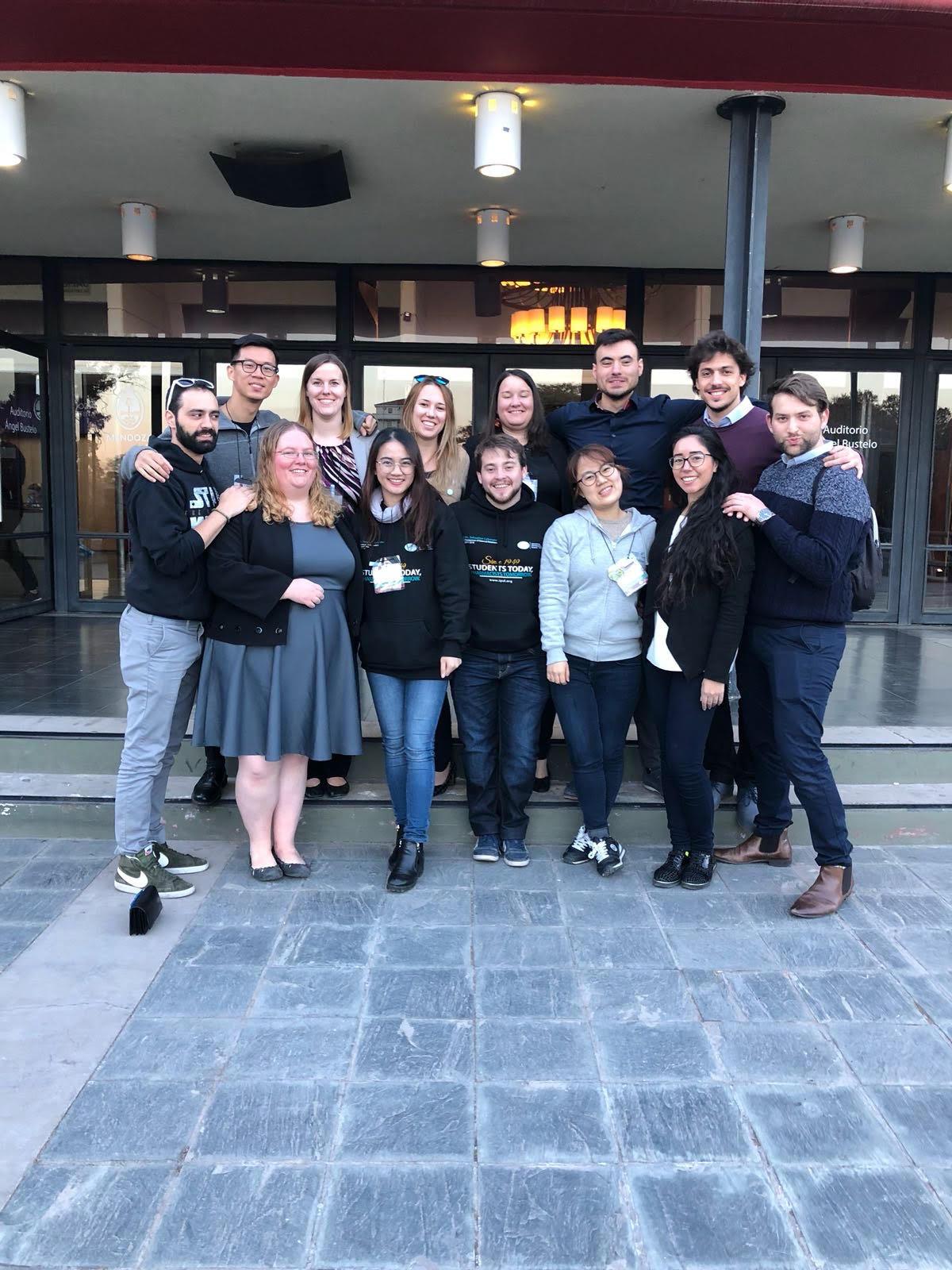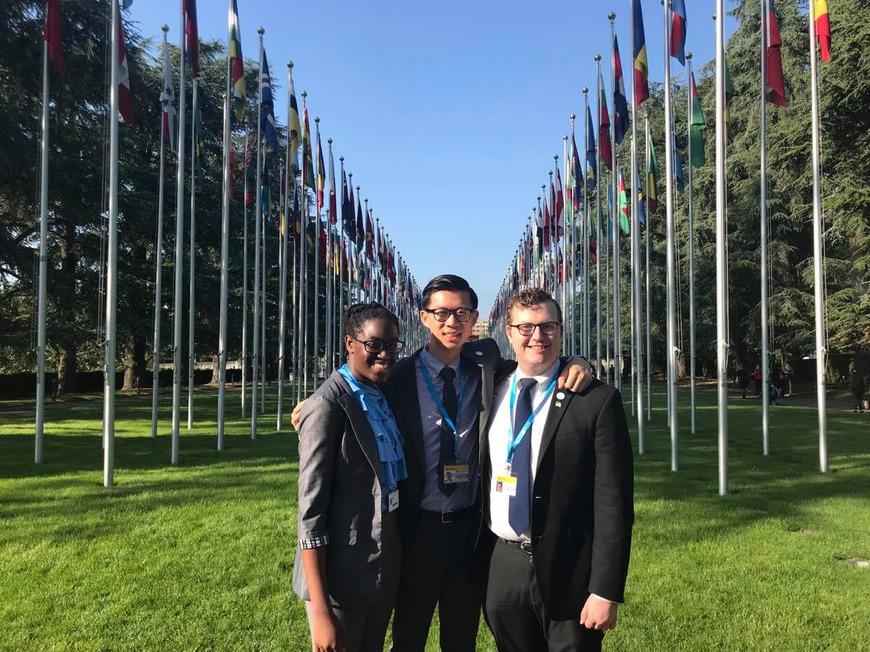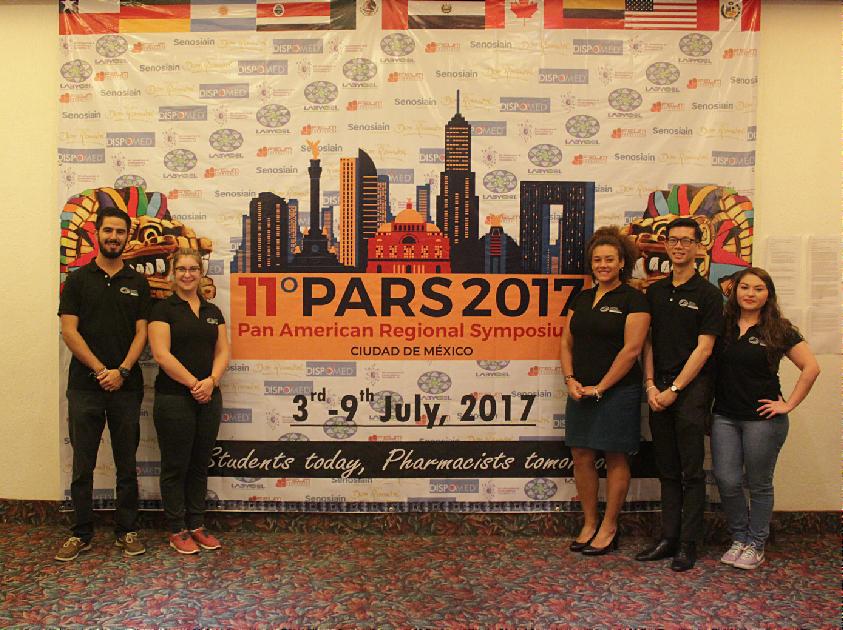
10 minute read
HLM Interviews: Matthew Hung
Angela Micovic, a member of the PARO Media and Publications Subcommittee had the unique opportunity to interview an Honorary Life Member, Matthew Hung, a Canadian hospital pharmacist over Zoom to discuss his previous and current involvement with IPSF PARO and how this has shaped his professional identity. Please enjoy this exclusive interview – we hope it will encourage pharmacy students to seek more ways to get involved with IPSF and PARO!
Start by telling us a little bit about yourself.
Advertisement
I graduated from Laval University in Quebec City in 2018. From there, I went on to complete my residency at the University of Montreal and the Montreal Jewish General Hospital in 2019. Today, I work as a clinical staff pharmacist in critical care at St. Mary ’ s Hospital. It is a teaching hospital set in the middle of the city, and it is affiliated with McGill University. I also consult for the International Pharmaceutical Federation (FIP) in Practice Development where I am involved in research, writing documents, and supporting the staff in this area. I also sit as a volunteer member on the Canadian Society of Hospital Pharmacists Pharmacy Practice Vision Committee. We work on projects that promote excellence in hospital pharmacy practice.
How did you initially become interested in IPSF?
I first discovered IPSF in a Facebook post during my first year of pharmacy school. I saw a post about their delegation at the World Health Assembly (WHA), and I found that it was a unique experience, so I started to look further into what it was all about. From there, I ended up applying to the Pan American Regional Office (PARO).
What IPSF positions did you hold?
The first two positions I held with PARO were the Diabetes Mellitus & Healthy Living Campaign Subcoordinator as part of the Regional Projects Subcommittee and member of the Membership Promotion Subcommittee. During this year (2015), a call for the Regional Media and Publications Officer opened, so I applied, and my application was successful. That same year I had the opportunity to attend the World Health Assembly (WHA) for the first time. The following year, I was elected as PARO Secretary (2016-2017), where I really learned a lot about the Federation. I had the opportunity to attend PARS which was held in Mexico City, where I was then appointed to the position of Chairperson of PARO. During my year as Chairperson (20172018), I was on a student exchange in France, so this facilitated travelling to the Netherlands and other places for various meetings. I also attended the WHA for a second time, but this time I was a member of the Organizing Committee, so I had more responsibilities with regards to developing policy statements and other contributions. That same year, I attended the Pan American Regional Symposium (PARS) in Peru along with World Congress (WC) in Argentina. At these events, I was able to visit different countries and provide talks about IPSF. The following year, I was Immediate Past Chairperson (2018-2019) and appointed an Honorary Life Member. In my final and fifth year of IPSF involvement, I was on the Advisory Board of IPSF (2019-2020).
What did you learn from your IPSF involvement?
I was PARO Chairperson in my last year of pharmacy school, and during my last semester I was on my exchange in France. I even had to have Regional Working Group meetings at 3 am due to the 6-hour time difference because the meetings were always based on when most people were available! Furthermore, it was challenging at times to prioritise tasks and time manage, but a trick that I found useful was scheduling a dedicated time to work on PARO tasks; I took a few hours of each Saturday to specifically work on IPSF so I wouldn ’t get behind on any projects or pending deadlines. I also worked as a pharmacy student and still had schoolwork to complete, so I would definitely say being organised and managing your time well is really important!
How did the skills you obtained from your IPSF involvement help you with your personal and professional life?
If I could go back, I would do it all over again! Professionally, it helps you learn about the various practices around the world and experience within IPSF helps you further develop competencies like time management and public speaking; skills that will help you and that you can apply later in life. Travelling on your own and attending conferences or symposiums help you grow as a pharmacist beyond the classroom. I personally think it’ s one of the best ways to network because you develop friendships from around the world! You also get to meet up with these friends when you go visit that country again. You may even end up working with these people again in subsequent years to come. Other skills I developed during my time with PARO include some we have already mentioned, like time management, organisation, and task prioritisation. Public speaking during meetings and General Assemblies can be nerve racking at first, but it helps you become more culturally aware when you consider the audience is people of different backgrounds who practice pharmacy differently across various countries.

You ’ re still involved in so many ways to this day! Did any of your IPSF involvement help guide you into a residency program or was that something you had always planned to do after pharmacy school?

In terms of pharmacy school, I always liked being involved in something. I don ’t think I could have only studied for my classes, so that’ s why I always felt like I had to be involved with something else, like IPSF. Even during residency, I felt like I needed to continue something on the side which is how I got that volunteer experience with FIP. Now in my hospital career, I still feel like to I need to do something on the side to contribute and develop my skills in different ways.
Can you describe how the global COVID-19 pandemic affected your career this past year?
Hospital Career
In terms of my career at the hospital, COVID really affected that in terms of new policies, increased patient load, and the number of students we were able to keep at the hospital to keep everyone safe and avoid outbreaks. There were a lot of adjustments that had to be made. During the First Wave in Canada, my hospital was lucky enough to be considered a “ green ” hospital, so we weren ’t admitting COVID patients, especially in our ICU. It was still scary because we never knew when things would change, and we were the hospital that would take over patient care if other hospitals in the city ever became overloaded. Our ICU does not have a large capacity, so we had to take over the recovery room, rebuild the crash cart from scratch, and review policies to ensure we were ready if we ever saw a rise in ICU numbers. All of these preparations were challenging to manage. Fortunately enough for the patients, we didn ’t have to get to that level. During the Second Wave, our hospital became a “ red” hospital and we started admitting positive patients, but our ICU remained “ green ” the whole time, so there was never too much of a burden on the system in the city where we had to accept ICU-level patients. Nonetheless, we still felt the effects because other units were at maximum capacity.
IPSF
Due to travel restrictions around the world, events like WC and PARS were cancelled. Many of these events were converted into online or virtual events which were good ways to adapt, but it isn ’t quite the same thing as taking the time off to travel to a different country or city and working with other members in person.
FIP Consultant Work
In terms of my work with FIP, I don ’t think it impacted the method of working because it would have been remote regardless, but our projects were adjusted so that COVID-19 documents and guidelines were being prioritised and updated, especially at the beginning of the pandemic.
What lessons did you learn from the current pandemic and how does that empower us as a profession?
I would say being able to adapt and work within your healthcare team. At the beginning of the pandemic, there many drug shortages in Canada for medications like propofol and other sedatives. Pharmacists have the expertise in pharmacotherapy to make recommendations and work with physicians and nursing staff to make sure we are optimising our medication use as best as possible, which is so important. Realising the role of a community pharmacist as a first-line healthcare provider was also very important because clinics had temporarily closed at the beginning of the pandemic, and patients were not able to leave their homes to see their doctors. Reinforcing the role of the community pharmacist as a frontline health professional was therefore a huge aspect of the pandemic for this reason and should be encouraged beyond this, pandemic or not. Community pharmacists are so close to their patients and the community in which they practice. Their role, such as being able to provide appropriate follow up, is super important.



What is some advice you would provide for students looking to become involved with IPSF PARO?
I ask every student I precept if they have heard of IPSF or similar organisations! I am biased when I say this, but I do think every pharmacy student should experience these opportunities, even if they have the smallest interest. I’ ve helped encouraged friends to participate in the Student Exchange Programme (SEP), and I think getting to participate in events like PARS is a really unique opportunity. There is a range of opportunities with IPSF and PARO, so depending on the time that you want to contribute, you can always find something that will fit your schedule and interests. I think it is also the best way to network and meet new, like-minded people! Living in this day and age allows you to have everything available to allow for networking and keeping in contact with others. As you graduate from school and move onto your career, you still keep many of these friends with whom you worked together on a committee or just happened to sit together at General Assembly. You provide encouragement for those who have a continued interest in international pharmacy and may even end up working together again.
What is some final advice you would provide to students about becoming future practicing pharmacists?
The first thing I would say is to join IPSF! It is a great way to develop many complementary skills and provide you with unique experiences! It is also a great way to build up your CV or resume when applying for residency or jobs because you get the opportunity to showcase your diverse experiences within the Federation and unique contributions to pharmacy. Pharmacy school isn ’t easy and being involved with IPSF is an additional contribution you have to make, but I think it is well worth it because of the people you meet and the professional experiences you get out of it.
Attending symposiums and conferences are great networking opportunities. You get to learn how to communicate with people who may not speak the same native language as you and learn how pharmacy practices differ across countries.
The world of pharmacy is also pretty vast. Usually, we get stuck between choosing community or hospital practice but there are tons of options out there – public health, research, academia, epidemiology, humanitarian work, drug development, and so many other subsets of healthcare! IPSF is just one of the ways to discover and explore these possibilities.
------------------------------------------------------------------------------------------------------------------------------------------------Thank you to Matthew Hung for taking the time to provide his own experiences about his involvement
with IPSF, PARO, and FIP. We would also like to extend a thank you for all his hard work and
contributions as a frontline healthcare worker in Canada during COVID-19.












